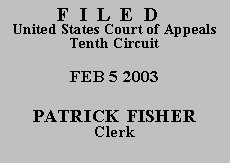

| UNITED STATES OF AMERICA,
Plaintiff - Appellee, Defendant - Appellant. |
No. 02-8039
D.C. No. 00-CR-54-D |
We ordinarily review factual findings underlying guideline sentencing enhancements for clear error, and the application of the guidelines de novo. United States v. Robertson, 45 F.3d 1423, 1444 (10th Cir. 1995). Because Mr. Dorsey raises both of his objections for the first time on appeal, however, we review for plain error only. United States v. Tisdale, 248 F.3d 964, 981 (10th Cir. 2001), cert. denied, 534 U.S. 1153 (2002).
Mr. Dorsey first maintains the district court erred in applying a four-level enhancement under U.S.S.G. § 2K2.1(b)(5) because the evidence failed to support a finding that he possessed the illegal weapon in connection with a drug trafficking offense. This is a factual issue. It is well-settled in this circuit that factual disputes not brought to the attention of the court cannot constitute plain error. Id. at 982. Accordingly, Mr. Dorsey's first allegation of error must fail.
Mr. Dorsey's second challenge to his sentence constitutes a factual dispute as well.
The district court calculated Mr. Dorsey's criminal history category of V based on a total of eleven criminal history points. These included three points each for a 1987 conviction for receiving stolen property and a 1987 conviction for delivery of a controlled substance. Based on the commentary to U.S.S.G. § 4A1.2, Mr. Dorsey now argues that these two offenses were "related cases" and therefore should only have been counted once together, instead of each individually.
The commentary contained in Application note 3 to U.S.S.G. § 4A1.2 provides:
Related Cases. Prior sentences are not considered related if they were for offenses that were separated by an intervening arrest (i.e., the defendant is arrested for the first offense prior to committing the second offense). Otherwise, prior sentences are considered related if they resulted from offenses that (A) occurred on the same occasion, (B) were part of a single common scheme or plan, or (C) were consolidated for trial or sentencing.
See U.S.S.G. § 4A1.2, application note 3. Mr. Dorsey maintains that although the pre-sentence report indicates the dates of arrest for these two offenses were not the same, there is insufficient evidence to conclude that the second offense actually occurred after the date of the first arrest. Mr. Dorsey argues the "otherwise" portion of the commentary therefore comes into play, and the fact that the two 1987 convictions were consolidated for sentencing should have required the district court to consider the two offenses related and count them only once for criminal history points. We do not reach the application of the "otherwise" portion of the commentary because the first portion of the commentary presents a disputed factual issue, i.e., whether Mr. Dorsey was arrested for the first offense prior to committing the second offense. Once again, because a factual dispute not brought to the attention of the court cannot constitute plain error, see Tisdale, 248 F.3d at 982, Mr. Dorsey's second allegation of error must fail as well.
We AFFIRM.
ENTERED FOR THE COURT
Stephanie K. Seymour
Circuit Judge
*.After examining appellant's brief and the appellate record, this panel has determined unanimously that oral argument would not materially assist the determination of this appeal. See Fed. R. App. P. 34(a)(2) and 10th Cir. R. 34.1(G). The case is therefore submitted without oral argument. This order and judgment is not binding precedent, except under the doctrines of law of the case, res judicata, or collateral estoppel. The court generally disfavors the citation of orders and judgments; nevertheless, an order and judgment may be cited under the terms and conditions of 10th Cir. R. 36.3.